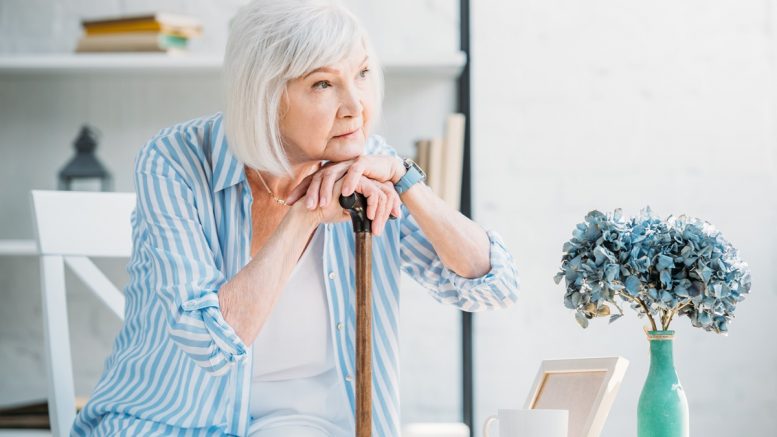Social connection is vital for both our physical health and mental well-being – this is universal, irrespective of our age, gender, community, or culture. When we don’t have good social connections in our lives, we feel lonely and isolated. As we age, we are especially at risk of this.
Numerous studies indicate that nearly 40% of people over 65 experience negative feelings regarding their loneliness, which can result in psychological pain manifesting as despair and emptiness. At Tunstall Spain, we are experiencing first-hand how this directly affects the physical and psychological well-being of vulnerable people.
Psychologically, loneliness is heartbreaking and can even affect a person’s physical health. Loneliness can trigger depressive symptoms, worsen sleep problems, decrease cognitive functioning, and elevate the risk of developing Alzheimer’s, as well as exacerbate any existing mental health issues (National Library of Medicine).
Every day, our call centres witness this loneliness first-hand. For example, many of our call centre operators refer to a common phenomenon where older women in particular claim that their call was a mistake, that they accidentally hit their button when they were trying to ‘open a jar’ against their chest. Our team recognises that this is code for someone who used their emergency call button just because they wanted to talk to someone.
But it doesn’t have to be this way. The more an elderly person has social connections, the greater the protection against suffering from loneliness and developing neurological conditions such as dementia. And this sits at the heart of how we address loneliness, as a health problem, in Spain.
So, what role does proactive and preventative care play in the future of health and care and how can technology help to reduce the impact of loneliness?
Using technology to support those most at risk from loneliness
According to the World Health Organization, 1 in 4 older people experience social isolation. In fact, the UN and WHO have recognised social isolation and loneliness as a priority public health problem: people lacking social connection face a higher risk of not only mental health conditions such as anxiety and depression but also physical health conditions such as cardiovascular disease and stroke. Taken together, the WHO Commission on Social Connection reports that people lacking social connection face a higher risk of early death.
Tunstall Healthcare operates globally, and I have responsibility for all our operations across Spain. Spain is one of the countries with the highest ageing population rates internationally, with the elderly representing 20% of the Spanish population. According to projections by the Spanish National Institute of Statistics, by 2040, this could increase to over 27% of the total population – totalling over 14.2 million elderly people.
Ageing often comes with a reduction in social networks, whether due to children and extended family living further away, loss of friends due to illness or age-related death or even a decline in the individual’s health and wellbeing. All these factors can hinder activity for people and restrict their participation in the local community. This can occur anywhere, but can be especially pronounced in rural areas where geographic isolation and lack of infrastructure can limit social networks. This lack of connection with family and friends is one of the most common causes of loneliness, with elderly people left with no immediate support or sense of community.
What does personalised care look like?
Using technology such as telecare to support older people to live independently is an established approach in Spain. And loneliness is one of the many issues we are able to address in our proactive technology model of telecare.
The telecare service is an essential preventive programme across the region for risk detection, primarily aimed at the elderly population. The majority of individuals using these services in Spain are over 80 years old; at Tunstall Spain, this figure exceeds 70%.
Tunstall Spain has been delivering proactive care programmes since 1994, and personalised care since 2016. The teleassistance service in Spain combines telecare monitoring and response, coordinates social care and third-party services and delivers proactive outbound contact. In all, Tunstall Spain takes care of more than 300,000 users.
Across our Spanish telecare partnerships, we have implemented a proactive, personalised care model to pre-empt and address any care needs before they arise, throughout a person’s care journey.
The model has evolved from providing reactive services – responding to a critical incident, such as a fall, as it happens – to putting proactive measures in place to prevent the event from occurring or reduce its severity and potential impact before it takes place.
Going one step further, we are now able to personalise this by tailoring how we support an individual based on their specific needs. We can use data collected over time to predict when incidents are about to happen. By understanding early warning signs, we can intervene to put preventive measures in place.
In Spain, the system is built to focus on three areas: monitoring the user’s activity at home, talking to them about their perception of their own health, and observing their routines or habits of behaviour. We then use strategies and technology to detect any anomalies in a routine that may present risks – this includes the potential risk of experiencing unwanted loneliness.
Specifically for detecting loneliness, risk factors such as age, living alone, perceived social support, and social participation are all considered. If a risk factor is detected, the feelings of loneliness are identified, using the Jong Gierveld loneliness scale, which also helps differentiate the type of loneliness experienced by each individual. This ensures that the service provision is always delivered to those who need it most, and they will always receive an appropriate and agreed level of personalised assistance.
Our call centre staff use proactive care measures, such as making outbound calls, to check on people and issue daily reminders to the individual, such as to take medication or about doctor’s appointments. Not only does this help to address loneliness, but it also provides a level of personalised care for the individual, a means of building rapport and a sense of community.
Connecting from your own home
One of the largest regional governments in Spain came up with a new initiative to bring the service closer to users by incorporating advanced digital technologies into their daily lives. The idea is that individuals are connected through group video calls, hosted and managed by care professionals, and in turn leveraging technology to help reduce the risk of loneliness.
Historically the most common devices used to achieve this would be digital tablets or smartphones, but these tend to be a challenge for people with visual and auditory difficulties, not to mention those who have not acquired sufficient digital skills to operate these devices.
For this reason, Tunstall has proposed a technological solution that converts the user’s conventional television into an interactive device that can bring friends, family and caregivers into the comfort of their homes via a video call. This gives them instant connection to the wider community. It provides an accessible and non-intrusive option for a group call or a conversation between the individual and a care provider. Through the development of this system, a community engagement program has been born, bringing together over 500 people via a virtual community space, where they can connect to individuals in similar situations or across other care settings with comparable circumstances.
Elsewhere, throughout major cities across Spain, a network collaboration project has been developed in partnership with volunteer organisations, where telecare technology plays the role of detecting the risk of loneliness and referring individuals in need of help to improve their social network, participate in community activities and resources, as well as for those who cannot leave their homes or require a chaperone.
Loneliness and social isolation are major threats to elderly people all around the world. Connecting people with like-minded individuals at a community level will undoubtedly help alleviate these challenges. In Spain, we increased the stay on the service from 4 years to almost 5.5 years, suggesting users are staying happier and more independently at home for longer periods of time. This has benefits not only for the end users—but the wider health and care systems who benefit financially and operationally when they can keep people independent at home for longer, rather than prematurely having to live in care homes or residential facilities.
Loneliness isn’t just a feeling—it’s a health crisis. With predictive telecare connected to the right networks and support systems, we can fight isolation, champion connection and promote good health—enhancing quality of life for all.
By Abel Delgado, Managing Director of Tunstall Spain



